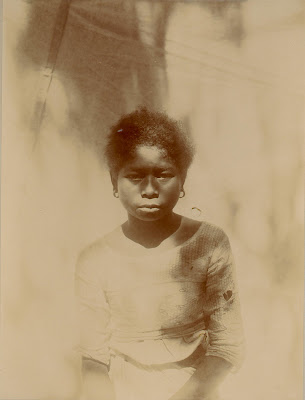(Above) Thai Negrito; mother & child.
(Above) Young Negrito Girl, Mariveles (Philippines) in the year 1901
OBG's WOW (Word of the Week) - Negrito - is a collective term widely used among anthropologists, meaning Asian tribal people (that live in Oceania and the southeastern part of Asia) with a dark-skinned complexion, small stature and "peppercorn" curled hair (besides other characteristics) speaking Aslian languages. The Negrito are also described as a semi-nomadic group in Southeast Asia. They include the Aeta, Ati and at least 25 other tribes of the Philippines, the Semang of the Malay peninsula, the Mani of Thailand and 12 Andamanese tribes of the Andaman Islands. Occasionally, some Negrito are referred to as Pygmies, bundling them with unrelated peoples of similar physical stature in Central Africa. [Source: Merriam-Webster & Wikipedia & Wikipilipinas] Mani is what the Thai Negrito call themselves. The word is of Mon-Khmer origin and means "human being." The physical characteristics of the Mani people are superficially similar to Negroid Africans. There are major differences, however, and the Negrito are not Africans or Negroids. The Thai Mani speak the Aslian Tonga language (they really are Semang living in Thailand, the differences are not great and Tonga is closely related to the Semang language.) The Malaysian Semang are the "classical" Malaysian Negrito and speak a variety of different Aslian languages. The Orang Darat is a group rather similar to the Semang but is thought to have arrived in a later wave of migration and to be physically a little shorter than the Semang. They also speak Aslian languages. [Source: Andaman.org]
(Above) The Thai Mani hanging out.
(Above) Thai Mani family
(Above) Pure Negrito woman and mixed blood, with babies / Zambales (Philippines) in the year 1903
(Above) Negrito girls of Zambales (Philippines), one wearing necklace of dried berries in the year 1903























11 comments:
interesting article but I would strongly disagree that they are not African or somehow related. Many types of people some where in history migrated to other parts of the world. Just like you find blacks living in India or the Korean's believe that the Eskimos ( please forgive me for being ignorant but I don't know the correct term ) related.
Mon at 6:05am from Facebook
just touching on that topic. Through genomics by sending a sample of saliva(yours), you can get a complete dna scan and the results show things like ancestrial history(orgin) and health risk (statistical)...interesting stuff. One thing was true...to get white, you had to start with black
Mon at 8:30am from Facebook
No matter what you believe about the origins of The Negrito, I like that the Thai Negrito refer to themselves as "Mani," whiich means human being. ;-)
Thanks for clarifying all of this for us.
Mon at 10:00am from Facebook
Another interesting article....keep them coming.
Mon at 11:36am from Facebook
Very interesting.
Mon at 12:08pm from Facebook
muy interestante!
Mon at 3:53pm from Facebook
i agree...ms.tracey...and some of them are now doing their best in our community....i am hoping that the government will continue to give them fair share in our society....
Mon at 5:23pm from Facebook
This is very interesting, I like how they refer to them as "Mani" so true, we are all HUMAN,I AM SO SICK OF THE RACE THIS, {on applications, and what not}WE ARE OF ALL DIFFERENT CULTURES, as I am Spanish & Italian, {could have black in me, also?}I am a Human not of Latina or Latino RACE, BUT STILL 1, THE HUMAN RACE.....Amen
Mon at 8:39pm from Facebook
"The theory of the [Negrito's] connection to Africa collapsed the moment the first unbiased scientific observers met living Andamanese Negritos face to face. Apart from dark skin and curly hair, they have little in common with any African population, including the African pygmies. There are, however, a few fascinating connections to the Khoisan of ... Read MoreSouth Africa. It is therefore quite sure that the Negritos are not Africans (except in the way all of us Homo sapiens originated in Africa). Clear archaeological evidence found so far of Negrito settlements in the Andamans does not go back more than 2,200 years but absence of evidence is not evidence of absence." [Source: http://www.economicexpert.com/a/Negritos.htm]
Mon at 10:20pm from Facebook
@Gretchen. Too bad they weren't getting their fare share to begin with. Doesn't make sense to me, although ethnic bias is worldwide and I shouldn't be surprised. Just sad, I guess.
Mon at 10:22pm from Facebook
Post a Comment